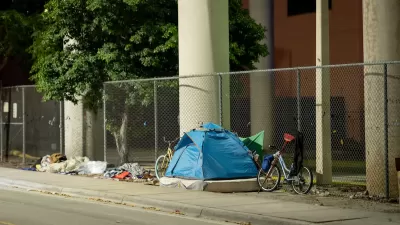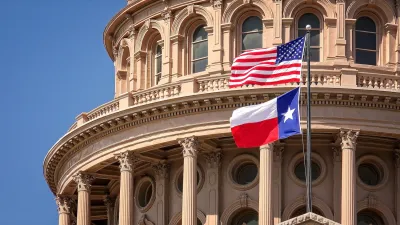President Trump recently ordered the clearing of encampments built by unhoused people on federal land in Washington, D.C.

In an opinion piece in Greater Greater Washington, Susannah Petitt argues that destroying the encampments formed by unhoused people in Washington, D.C., a move ordered by a Trump executive order, does nothing to stem the homelessness crisis.
Like many advocates for homeless Americans, Petitt points to the systemic problems that are pushing more people into homelessness. “While removing these encampments may make the city’s homeless residents less visible, it will do little to get to the root of the problem. When policymakers only see homelessness as an aesthetic problem, they miss the people and stories inside the encampments they wish to destroy.”
Destroying the relatively safe places people have found in encampments misses the real problem in DC, and will do little to improve safety. Ending homelessness requires supportive services that meet the needs of people where they are. Destroying encampments is just hiding homelessness from the view of the West Wing.
According to Petitt, reducing homelessness requires coordinated support from governments, community organizations, and social networks. “If the DC government and President Trump are serious about getting the homeless off the streets, they should emphasize community care by better supporting outreach efforts by nonprofits and individuals, not destroying encampments.” As individuals, Petitt urges people to take a minute to meet their homeless neighbors and offer a gesture of assistance or support.
FULL STORY: Destroying encampments won’t reduce homelessness in DC

Planetizen Federal Action Tracker
A weekly monitor of how Trump’s orders and actions are impacting planners and planning in America.

Congressman Proposes Bill to Rename DC Metro “Trump Train”
The Make Autorail Great Again Act would withhold federal funding to the system until the Washington Metropolitan Area Transit Authority (WMATA), rebrands as the Washington Metropolitan Authority for Greater Access (WMAGA).

DARTSpace Platform Streamlines Dallas TOD Application Process
The Dallas transit agency hopes a shorter permitting timeline will boost transit-oriented development around rail stations.

Renters Now Outnumber Homeowners in Over 200 US Suburbs
High housing costs in city centers and the new-found flexibility offered by remote work are pushing more renters to suburban areas.

The Tiny, Adorable $7,000 Car Turning Japan Onto EVs
The single seat Mibot charges from a regular plug as quickly as an iPad, and is about half the price of an average EV.

Supreme Court Ruling in Pipeline Case Guts Federal Environmental Law
The decision limits the scope of a federal law that mandates extensive environmental impact reviews of energy, infrastructure, and transportation projects.
Urban Design for Planners 1: Software Tools
This six-course series explores essential urban design concepts using open source software and equips planners with the tools they need to participate fully in the urban design process.
Planning for Universal Design
Learn the tools for implementing Universal Design in planning regulations.
Municipality of Princeton
Roanoke Valley-Alleghany Regional Commission
City of Mt Shasta
City of Camden Redevelopment Agency
City of Astoria
Transportation Research & Education Center (TREC) at Portland State University
US High Speed Rail Association
City of Camden Redevelopment Agency
Municipality of Princeton (NJ)





























